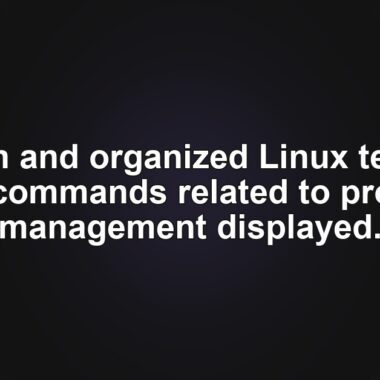![]()
Top Tips to Secure Your Linux VPS Hosting
Knowing how to secure your Linux VPS hosting is crucial to avoid cyber threats and ensure your virtual server’s safety.
Understanding Linux VPS Security and Its Vulnerabilities
While Linux VPS security is generally robust, it does have some vulnerabilities that cyber threats can exploit. It’s essential to be aware of these vulnerabilities to protect your server effectively. Here are some common threats:
- Malware: Intrusive software like Trojans, ransomware, viruses, and spyware designed to harm your server.
- Sniffing Attack: A hacker intercepts and extracts data from your network using packet sniffers.
- Brute-Force Attack: An attacker guesses login credentials using trial and error.
- SQL Injection: A hacker exploits code in a web application to access the server’s database.
- Cross-Site Scripting (XSS): A hacker injects malicious code into a website.
- No Function-Level Control: Unauthorized users gain root privileges due to improper access verification.
- Broken Authentication: Identity theft due to unencrypted data, weak passwords, or poor session timeouts.
Key Elements to Monitor on Your VPS
Before implementing security measures, monitor these crucial elements in your virtual private server:
- VPS hosting security
- Server software
- SSH connection
- Root access and logins
- Passwords and credentials
- Firewalls
- FTP connection
- User rights and privileges
- Server logs
16 VPS Security Tips to Protect Your Server
1. Research Your Web Hosting Security
Your VPS hosting provider should have a strong security infrastructure. Providers like Hostinger offer comprehensive security practices, such as:
- Web application firewall
- Suhosin PHP hardening
- PHP open_basedir protection
- BitNinja’s full-stack server protection
- Advanced DDoS mitigation
- Monarx anti-malware
- Secure sockets layer (SSL)
2. Change the Default SSH Port
Using the default SSH port (22) can make your server more vulnerable to attacks. Change it to enhance security:
- Open Terminal and log in to SSH.
- Edit the service configuration file with
nano /etc/ssh/sshd_config. - Locate
Port 22, change it to a new port number, and save the changes. - Restart the SSH service with
service ssh restartfor Debian/Ubuntu orsystemctl restart sshd.servicefor CentOS/RHEL.
3. Disable Root Login
Disabling root login enhances security. Create an alternative user with root-level command privileges:
- Edit
/etc/ssh/sshd_configand setPermitRootLogin=no. - Restart the SSH service with the appropriate command for your OS.
4. Use Strong Passwords
Create complex passwords using numbers, symbols, and varied characters. Change them regularly and avoid sharing them.
5. Start Using SSH Keys
Use SSH keys for VPS authentication to enhance security:
- Generate keys using
ssh-keygen -t rsa. - Follow prompts to save keys and set a passphrase.
6. Setup an Internal Firewall (IP tables)
Set up a firewall to filter requests and prevent malicious traffic:
- Install iptables with
sudo apt-get install iptables. - Check configuration with
sudo iptables -L -v.
7. Configure Your UFW
Use UFW to manage firewall rules easily:
- Enable UFW with
sudo ufw enable. - If needed, install with
sudo apt-get install ufw. - Verify status with
sudo ufw status.
8. Using SFTP Instead of FTP
SFTP encrypts data and credentials, unlike FTP, enhancing security:
- Connect with
sftp user@server_ipaddressorsftp user@remotehost_domainname.
9. Set Up Fail2Ban
Fail2Ban monitors logs and blocks IPs after failed login attempts:
- Install with
sudo apt-get install fail2ban. - Check status with
sudo systemctl status fail2ban.
10. Install an Antivirus
Install ClamAV on CentOS for virus protection:
- Install EPEL with
sudo yum -y install epel-release. - Install ClamAV with
sudo yum -y install clamav-server clamav-data clamav-update clamav-filesystem clamav clamav-scanner-systemd clamav-devel clamav-lib clamav-server-systemd.
11. Use a Malware Scanner
Enhance security with a malware scanner like Monarx, included with Hostinger VPS plans. Follow setup steps in your Members Area.
12. Set Up a VPN for Your VPS
Set up a VPN to encrypt traffic and mask your IP address:
- Install OpenVPN on CentOS.
- Set up with commands including
sudo rpm --install openvpn-as-*.rpm. - Access UI and set a password.
13. Review User Rights
Limit user access to prevent unauthorized server modifications:
- Create groups with
sudo addgroup my_group. - Manage users with
adduser first_userand modify access withsudo usermodcommands.
14. Disable IPv6
Disable IPv6 to reduce potential vulnerabilities:
- Edit
/etc/sysctl.d/99-sysctl.confto disable IPv6. - Apply changes with
sudo sysctl -p.
15. Monitor Your Server Logs
Regularly monitor logs in /var/log to detect unusual activity:
- Change directory with
cd /var/log. - View logs with
sudo cat syslog.
16. Keep Your Applications Up to Date
Regularly update software to patch vulnerabilities:
- Use
sudo apt-get updateandsudo apt-get upgradeon Debian/Ubuntu. - Use
sudo yum updateon CentOS/RHEL.
For automated updates, configure yum-cron on CentOS/RHEL.
Consider using Hostinger for reliable VPS hosting with robust security features.
Conclusion
Securing your VPS server is critical to protect sensitive data. While Linux is known for its robust security, it’s not immune to vulnerabilities. By implementing the security tips outlined in this guide, you can significantly enhance your VPS hosting security. If you have any questions or additional tips, feel free to leave a comment below.
For more information, check out our guide about web application security to further protect your site from cyber threats.
VPS Security FAQ
What is VPS security?
VPS security refers to protecting your virtual private servers from cyber threats like SQL injection, malware, and sniffing attacks. It involves proper server management, bug patching, and applying security features.
Why Is VPS security important?
Weak VPS security can make your server vulnerable to attacks, compromising privacy, leaking sensitive data, and causing financial losses. It can also harm a business’s reputation, affecting sales and customer trust.
Is VPS hosting more secure than other types of hosting?
VPS is generally more secure than shared hosting due to isolated resources and additional security features. VPS and dedicated hosting offer similar security levels, but VPS includes automatic failover to prevent data loss.
Does VPS have a firewall?
Yes, VPS typically has a pre-configured firewall that users can adjust. Linux distributions offer built-in firewall applications like Uncomplicated Firewall and iptables.
👉 Start your website with Hostinger – get fast, secure hosting here 👈
🔗 Read more from MinimaDesk:
- How to Disable xmlrpc.php in WordPress: A Step-by-Step Guide
- The Ultimate Guide to WP-Content: Access, Upload, and Hide Your WordPress Directory
- How Many WordPress Plugins Are Too Many? Optimize Your Site for Success
- Mastering WordPress: Solving Broken Permalinks Effortlessly
🎁 Download free premium WordPress tools from our Starter Tools page.








